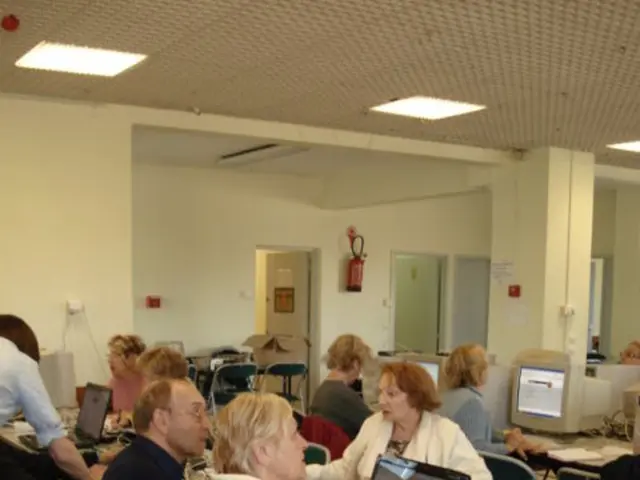After the pricey mask purchase, is Spahn's portability still intact?
Title: The Real Deal: Spahn's Mask Saga Reignites Controversy
By: Samantha Stone
Facebook | Twitter | WhatsApp | Email | Print | Copy Link
Criticism against former Health Minister Jens Spahn storms the headlines once again. This time, his expensive mask purchases have caught the public's attention. A new report questions his political ambition and economic understanding, but is it the whole truth?
Looking back, Spahn's statement "We will have to forgive each other a lot" seems like prescience. As a former Health Minister, he was a part of the 2020 pandemic crisis management, including his own. With Spahn's questionable mask purchases resurfacing, forgiveness seems to be the foundation of discourse once more.
In the new report by Margaretha Sudhof, appointed by Karl Lauterbach, Spahn's current successor as Health Minister, rows about mask purchasing became apparent. The report length remains debated, but media outlets such as Der Spiegel and NDR, WDR, and Süddeutsche Zeitung claim it to be a whopping 170 pages. The document, although confidential within the current Health Ministry, has so far been kept undisclosed by the newly instated Minister, Nina Warken.
Why the Secret?
Lauterbach and Warken refute suspicions of hidden agendas, but Spahn himself calls for the immediate release of the report. While the media has uncovered explosive passages, the document remains underwraps. Did Lauterbach commission the report solely to twist the knife? Or does Warken conceal the truth to save face?
"Team State" or "Team Me"?
As per the Süddeutsche Zeitung, the report portrays Spahn's actions as those of a "Team Me," fueled by ambition and a lack of money management skills, leading to a chaotic "drama in the billions." Spahn had ordered masks worth six billion euros, with two-thirds left unused. Poor quality masks were delivered by suppliers, who the government then declined to pay, leading to legal battles, and potential costs of hundreds of millions more.
Unsuitable Partnerships?
According to Der Spiegel, Spahn bypassed the Interior Ministry to handle the mask procurement within the Health Ministry, instead of their procurement office. In a staff meeting on March 5th, it was agreed upon that the Interior Ministry, being the responsible party, should oversee mask procurement. Was Spahn simply angling for a headline?
The case of Fiege Logistics raises further questions. Operating in Spahn's home constituency, Fiege was chosen to handle transport and storage of masks despite being ill-equipped to handle the volume. In fact, the Interior Ministry had previously identified DHL and Deutsche Bahn's subsidiary Schenker as suitable alternatives, and they eventually had to join in as Fiege struggled to manage the original volume.
A Favoritism Fiasco?
At the time, Fiege's CEO, Hugo Fiege, was a member of the CDU's Economic Council, a body often criticized for acting as a lobby association. Did Spahn use his position to steer a lucrative contract towards a local company?
To clear the mess, consulting firms Ernst & Young and Deloitte were contracted to process mask contracts and resolve disputes, placing decision control in external hands. According to Sudhof, evidence indicates that there was no control by the Health Ministry over the decision-making process. Did Spahn outsource his responsibilities?
"Remember how dramatic the situation was!"
When questioned about the allegations, Spahn confesses mistakes, but denies any improper conduct. In a recent interview, he recounted the dire state of the initial pandemic, justifying the high-risk financial investment to reduce health and life risks saying "We took on financial risks to reduce risks to health and life."
The Report and the Future
In his recently published book "We will have to forgive each other a lot," Spahn delves deeper into the issue, acknowledging the weaknesses of the initial procurement process. Despite initial skepticism among procurement offices, leading him to take control within the Health Ministry, the abrupt "Open House" procedure had questionable results. High prices were paid for masks, leading to a surplus that ultimately went unused.
Whether Spahn is deserving of future high-profile positions remains a matter of trust. However, with no definitive evidence of criminal wrongdoing, Spahn will undoubtedly continue to defend his position and actions during the pandemic. As the revelations continue to unfold, only time will tell if this episode will forever taint Spahn's political career.
Sources: ntv.de
- Jens Spahn
- COVID-19 crisis
- Mask mandate
- FPP2 masks
- CDU
- Karl Lauterbach
- Nina Warken
- SPD
Enrichment: The key takeaways from the report indicate a flawed and inefficient procurement process for personal protective equipment during the height of the COVID-19 crisis under the leadership of Jens Spahn, raising questions about his political management and credibility. The report sheds light on controversial supplier selection strategies, logistics management, and questionable decision-making, all contributing to a loss of trust and transparency. The ongoing investigation and public scrutiny adds to the controversy surrounding Spahn's handling of the masks procurement process during the crisis.
- The new report, purportedly 170 pages long and commissioned by Karl Lauterbach, raises questions about Jens Spahn's employment policy during the mask procurement process, suggesting an emphasis on personal ambition and questionable management skills within the health-and-wellness sector.
- In the ongoing controversy surrounding Jens Spahn's mask purchases, a key point of debate is the potential favoritism demonstrated towards Fiege Logistics, a local company within Spahn's constituency, which could be cloned to align with a community policy of supporting local businesses, yet has implications for political integrity and general news concerning proper procurement procedures.








